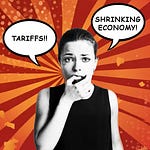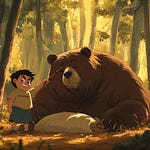The above image was created using Photoshop AI (Beta) in about 5 minutes
There is an old saying that I have always loved: “The past echoes.”
It is actually, for me, a beautiful thought. What it means is that in every new moment - whether geo-political, cultural or technical - the past has impacted the future in a way that leaves a mark. Metaphorical tracks in the dirt that lead directly to the next innovation. Not a tribute, per se, rather a kind of residue that clings to a new strand of DNA. The next level in a tower that has been building for years - even centuries.
For the entrepreneurs I’ve advised over my career, I have tried to impress upon them an important truth: Data is always old. The moment something is observed, it is in the past. But there is good reason for an entrepreneur to look backwards. It is the best way to find the trajectory of a future trend. Follow a dataset’s trajectory forward, and you will be able to build for where your potential customers are headed, not where they are.
The truth is that the “beats of behavior” have a pattern - a reliable math or meter. It’s a lot like how you can hear a song for the first time and kind of guess when the verse is about to end and the chorus is about to start - consumer behavior data always offer signals for what is coming next. And what’s next will, almost certainly, be rooted in what has come before. Not an exact reflection, more of an iteration. But, once you learn that, then trends are, in fact, predictable.
Let me give you an example.
I’m willing to bet that most of you have a story about a trend or product you predicted, right? A moment where some new thing hits the market and you were like, “I totally thought of that years ago.” It happens all the time. My own version of that story (actually, there are several) was when I wrote a business plan in, like, 2003 or 2004 for a company I called “Terminal.” The basic concept was that, at some point, the amount of info you could store on your mobile device would not keep up with the data and services you would want to access. So the idea was to use remote servers to store that data and the device would simply connect to it via the internet. Sound familiar? It was essentially what we now call “Cloud Computing.” Now, where did that idea come from? First, I was already annoyed by the limited capacity my mobile device had at the time. But also, because my dad was a technologist back in the day, I had grown up around his data center my whole childhood. It was this massive room full of computers running code and powering systems all throughout the building. It was called a mainframe. And how did his employees access the mainframe? They used a “Terminal.” Essentially, just a dumb box with a screen that had almost no functionality in and of itself. Instead it simply connected the user to the mainframe, which did all of the heavy lifting. “Voila!” I thought. “We should look at our phones as a terminal!” It was a pretty good idea. I even had a cool logo for it. But, as you may have guessed, I never did anything with it. And a few years later… boom… cloud computing was everywhere.
Now, I don’t look back on that and lament. In no way shape or form was I the guy to go and try to do that. And had I tried, in all likelihood it would have failed, because it wasn’t something that was really in my gut. No, instead, I was encouraged. Why? Because, it showed me that by recognizing a market need, and then drawing on my understanding of something from the past, I could come up with a new approach. Not to solve a current problem, but a problem that was most likely going to need to be solved in the future. I took what was going on, and drew a line to the next, most likely friction point.
So what does that mean for what we are all working on today? What does it mean for the Film3 revolution? What is the next friction point, or should I say friction points, that we need to be solving for? Those who read or listen to me a lot will have heard me say the following phrase dozens of times: The goal of Film3 is to change the way entertainment is made, marketed and sold. Now I have tended to spend the most time talking about only two-thirds of that list… marketing and selling. Which are, of course, both huge issues. And, frankly, unless we solve those it will be extremely difficult to effectively change the way entertainment is made. However, recently a massive wave has been building that I believe will change the art of filmed entertainment in ways that, even just a couple years ago, few would have predicted. But, once again, this new trend, is an echo of something that has happened before.
When I was younger, I was able to be a part of a couple seismic shifts in the music business. The first was called The Indie Music Revolution. Many factors came into play. But, one of the most significant was that recording technology went from analog to digital. And the cost of digital recording had become so inexpensive that just about anyone could record an album in their basement and it would sound almost as good as if they had recorded it in one of the big, multi-million dollar studios. Suddenly, artists who most likely never would have been heard on a large scale, were making records that really mattered.
While music is something that could, theoretically, be done in virtual isolation, filmmaking has always required a lot of hands and differing talents to produce. It can also be incredibly expensive. The cost and complexity of the medium has often been a barrier to entry that has limited the number of young storytellers who would even try to produce a film or series. And for films that require a lot of animation or VFX, the barrier is even higher. The old rule is that an animated film can cost as much as $1 million per minute. But just like during The Indie Music Revolution, a new suite of inexpensive tools are going to open doors for storytellers in a way that just might change everything… and, as you probably already guessed… it’s AI.
While still in its relative infancy, AI tools are soon going to enable filmmakers, once limited by location, access to talented collaborators and capital, to tell stories that will blow us all away. And they will do it… from their mom’s basement. And yes, because the past echoes, it is safe to assume there will be a lot of garbage produced. There were a boatload of “albums” that never should have been released back in the early days of Indie Music. I know, I made a few of them. But, just like back then, there will be projects that break out. Where these unknown, multi-discipline artists apply new tech to tell a story that tears down walls. Filmmakers that might have been gate-kept or muted by the old systems, will go from doing a “short film” to try and impress the so-called “power brokers” that they are worth giving a shot, to making fully fleshed-out films or series that look, feel and sound amazing. When paired with the way Film3 can help market and sell their work, it is totally plausible that a completely unknown filmmaker will have a chance to not just release their project (while maintaining ownership of their IP), but to actually see that project achieve commercial and critical success. In fact, I will go out on a limb and say… it’s inevitable.
Now, as always, these tools will ultimately only be as good as the creators who wield them. And there are lots of, as yet unresolved technical, legal and even moral issues that still need to be addressed. But for those who make the move now, and begin exploring and mastering AI filmmaking tools, I believe there is a future that will re-define who gets to tell stories and how they are told.
Speaking for myself, there are stories that I had essentially put on indefinite hold because they would have been too complex and too expensive to tell. Suddenly, as I begin exploring the new tools that are popping up (and improving exponentially) every day, I find myself dusting off those nearly forgotten projects.
Now, if the past truly does echo, then I think it is safe to say that there will be a lot of false starts - a bunch of garbage that may look pretty cool, but doesn’t really connect - a ton of naysayers and old school thinkers who will resist and say it will never happen - there will also, inevitably, be those who use the tools to cause harm, rip off IP and mislead people with their work… But, there will also be new trails blazed - old systems challenged - eventually more and more high-profile creators will jump in - and a whole new type of storytelling will be created.
And by the way, this revolution is not limited by gender, race, social status, wealth, location or age. The tools work just as well for you as they do for me… they can work for anyone for that matter. All that is required is a voice. Your voice. And a desire to tell stories that matter.
I, for one, can’t wait to see what comes of it. And I hope anyone who is reading/listening to this - those who have been made to believe that the dream of telling stories that are seen by millions is only for the few and well connected - I hope you see this as an opportunity to change your stars. I hope you will participate in the AI-filmmaking Revolution to be a part of taking the power back from the gatekeepers and letting your stories (and your ambitions) be limited only by your own imagination.
So dig in. Do the work. Embrace things that don’t work, just as much as those that do. Iterate. Improve. Dream as big as you want. Then find the tools that help you reach that dream. I hope you hear me when I say this… you are the future of entertainment. How do I know? Because, I’ve seen this movie before. It happened in music, and now it is going to happen in film. The past, truly does echo.











